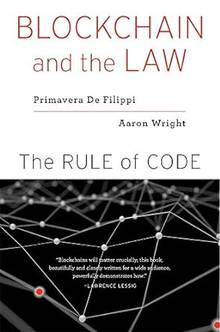Blockchain and the Law: The Rule of Code
Filippi, De Primavera / Wright, Aaron
Éditeur : HARVARD UNIVERSITY PRESS
ISBN papier: 9780674241596
Parution : 2019
Code produit : 1466236
Catégorisation :
Livres /
Gestion /
Management /
Innovation technologique
Formats disponibles
| Format | Qté. disp. | Prix* | Commander |
|---|---|---|---|
| Livre papier | En rupture de stock** |
Prix membre : 28,45 $ Prix non-membre : 29,95 $ |
*Les prix sont en dollars canadien. Taxes et frais de livraison en sus.
**Ce produits est en rupture de stock mais sera expédié dès qu'ils sera disponible.
Description
"Blockchains will matter crucially; this book, beautifully and clearly written for a wide audience, powerfully demonstrates how." -Lawrence Lessig "Attempts to do for blockchain what the likes of Lawrence Lessig and Tim Wu did for the Internet and cyberspace-explain how a new technology will upend the current legal and social order... Blockchain and the Law is not just a theoretical guide. It's also a moral one." -Fortune Bitcoin has been hailed as an Internet marvel and decried as the preferred transaction vehicle for criminals. It has left nearly everyone without a computer science degree confused: how do you "mine" money from ones and zeros? The answer lies in a technology called blockchain. A general-purpose tool for creating secure, decentralized, peer-to-peer applications, blockchain technology has been compared to the Internet in both form and impact. Blockchains are being used to create "smart contracts," to expedite payments, to make financial instruments, to organize the exchange of data and information, and to facilitate interactions between humans and machines. But by cutting out the middlemen, they run the risk of undermining governmental authorities' ability to supervise activities in banking, commerce, and the law. As this essential book makes clear, the technology cannot be harnessed productively without new rules and new approaches to legal thinking. "If you...don't 'get' crypto, this is the book-length treatment for you." -Tyler Cowen, Marginal Revolution "De Filippi and Wright stress that because blockchain is essentially autonomous, it is inflexible, which leaves it vulnerable, once it has been set in motion, to the sort of unforeseen consequences that laws and regulations are best able to address." -James Ryerson, New York Times Book Review























